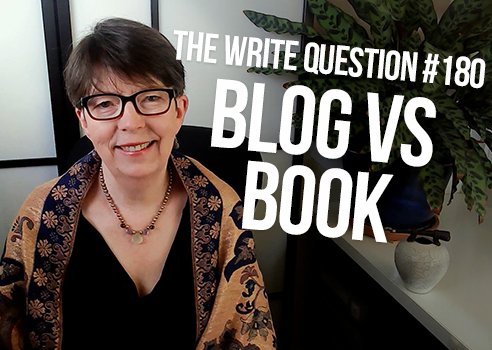Viewing time: 4 mins 5 secs
The Write Question is a weekly video podcast all about writing. Today’s question? Can blog posts go into a book? If you have a question you’d like me to answer you can email me, tweet me @pubcoach, or leave a message for me at the Skype account, The Write Question.
Transcript:
Can blog posts go into a book? That’s the topic I’m addressing today in The Write Question. I’m Daphne Gray-Grant, the Publication Coach, still in pandemic mode.
I have a question from Alex James, a writer based in Franklin, Tennessee. Here’s what they’ve asked by email….
“I began writing a blog but now I’m thinking I want to include this content in a book I’m going to write, down the road. Can I use the same content for both my blog and my book? Or should blog content be reserved for the blog?”
Thanks for your question, Alex. My quick answer is yes, of course you can put blog content into your book! In fact, many people write blogs for precisely that reason.
Why?
Well, most books need to be a minimum of 70,000 words. That’s a big, intimidating number. But if you write a 900-word blog post once a week then you’ll have your 70,000-word total in a year and a half.
Now you’re probably thinking, why would any reader PAY to buy a book if they can get the same info for free off the internet? But people do this ALL the time!
You need to understand that not everyone reads blogs regularly. Maybe they’re not comfortable with technology, maybe they don’t have regular access to the internet or perhaps they get tired of staring at screens all day. There are LOTS of reasons why a segment of the public will be willing to buy books rather than read the same info online for free.
That said, understand that when you join together your blog posts into a book, you still need to do a little extra work on it. At the very least, you’ll need to group material together into chapters and you also might want to provide some additional context or research. As well, you’ll want to fix spelling errors or typos, and update references that have become out of date. And you may even want to provide an index.
You should also consider removing some of your posts. For example, they might not be the right length for your book. Or, on reflection, you may feel the post isn’t quite up to your usual standards.
Finally, before publishing, be sure to use some beta readers – see my link to a post on that topic in the show notes below. And, assuming you are self-publishing, hire a professional copy editor to go over all the material one more time.
A serious copy edit is usually the main difference between a professional book and an amateur one. Other differences relate to having a good cover design and effective inside-page design, too. Be sure to hire professionals for both those jobs as well.
Casting a keen eye over all of your material, and putting only the best of the best into the book, will help ensure you have a top-notch product that people will be willing to pay for.
Finally, let me wrap up with a quote from digital marketing consultant Lee Odden: “A blog is only as interesting as the interest it shows in others.”
Alex, producing a book is about a lot more than just writing content. It also requires polishing that content to a certain high-gloss sheen. Worry less about making all the content brand new and more about the quality of what you are producing.
*
If you’d like to learn more about how to make writing a happier and more rewarding process, check out my latest book Your Happy First Draft. I don’t sell it in bookstores or via Amazon. The only place to buy it is on my website, link on the screen below and in the show notes.


